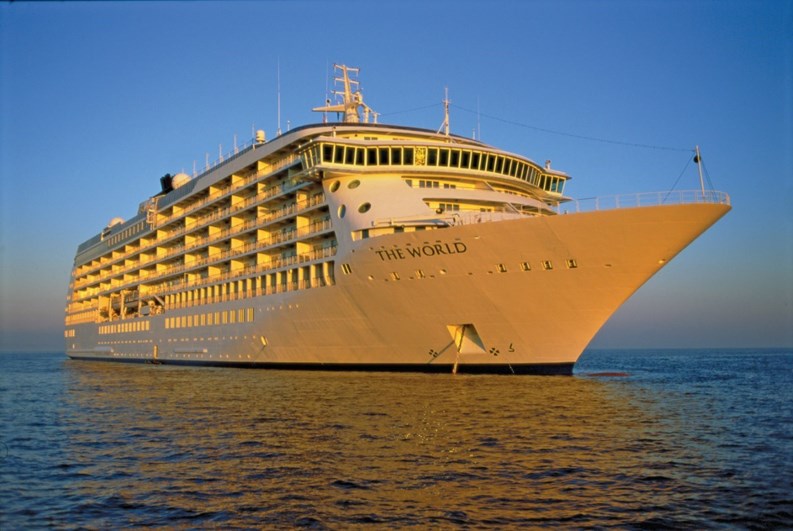The concept of "condominium living" has changed quite a bit since the term was first coined a generation ago.
Since the 1960s and ‘70s, when condominium home ownership became a widely available, viable alternative to single-family housing on the East Coast and across the country, the market has evolved to include many more variations on those first apartment-like complexes.
Campgrounds went condo; luxury hotels added condo units and penthouses to their upper floors; even cruise ships created floating condos for those who wished to spend their lives on the high seas and visit ports in nearly every country in the world.
And it hasn't been limited just to habitable living spaces. Picking up on the trend, oceanfront communities in places like Florida added “dockominiums,” or wet moorings; and “rackominiums,” for dry-docking yachts to the mix. In the western United States, one could purchase a garage condo for their second vehicle, as extra storage space, or to house a recreational vehicle off-season. Temporary rental storage units still seem to be a trend sought out by many homeowners.
“Camp-ominiums”
As some of the most affordable of the various "other-miniums," camp-ominiums have proliferated across the region.
One such community is Bayberry Cove, in Marmora near Ocean City. According to office manager Kelly Sudol, Bayberry Cove, which celebrates its 25th anniversary this summer, is "a perfect spot for people who want to be near the beach but want a quiet, relaxing environment." The camp-ominium is open from April 1 through October 31.
The 307-unit property "is a little different from your conventional condominium," says Sudol, "because the residents also own the property around their condo." Additional amenities include common ground areas, two lakes, an in-ground pool, tennis & basketball courts. Bayberry also has two bath houses with laundry rooms, a hot dog & water ice cart during the summer weekends, and an arcade game room.
"I think Bayberry is attractive to people because the of the location and the environment," says Sudol. "The owners vary from families with young children to retired folks. Most owners reside in Pennsylvania, Florida, central & northern New Jersey and some from New York, Delaware and Maryland. Some people just come down for weekends, while others stay through the whole season, so it feels like a resort, but it also feels like home. It's interesting how close everyone is as a community. There are social events, activities, games, pancake breakfasts, etc. which many residents attend during the summer."
A similar community is Sun Valley Beach Club and Resort in Stafford Springs, Connecticut, which has a backstory common to many camp-ominiums. The camp started as a beach club with a swimming pond and picnic areas in 1962, and began to clear campsites in the 1970s when beach club members expressed interest in staying for more than just a day or two. It became a cooperative association in 1988.
Sun Valley is seasonal, with two sandy beaches, a swimming pond and fishing pond, a garden house available for party rentals, a basketball court, pavilion and covered beach picnic tables, a restaurant and banquet hall.
According to Tracie Zelonka, a manager at Sun Valley, the sites themselves sell for between $18,000 and $35,000, but land with a camper already on-site may be leased for about $3,000 a year, including winter storage.
Condo-Hotels
So-called “condo hotels” began opening first in Florida. They offered second-home ownership along with possible rental income that could help offset the cost of the unit. Lately they have been moving into large cities in other areas, such as Las Vegas, Chicago and New York. In one Boston condo-hotel, the hotel and condo units, though housed in the same building, are separate entities. According to sales director Dinny Herron, apartments at The Intercontinental range in size from studios to penthouses with four bedrooms—and range in cost from $375,000 to $6.5 million. Units overlook Boston Harbor on Atlantic Avenue and don't look like hotel rooms—they're traditional condo apartments—but their owners have access to the adjacent luxury hotel amenities, such as exercise facilities, spa and swimming pool. Owners also have a private lobby and elevators and one or two valet parking spaces, and may rent out their units, but there is a six-month minimum. Monthly maintenance fees are based on the size of the unit and its value, such as the view.
Closer to home here in New Jersey is Summer Station in Cape May. This development offers yet another model of multifamily housing. According to Tim Conley, Summer Station's general manager, "We were originally built and designed as a condominium. Halfway through construction, the owners who were here said 'Let's try and rent these out,” because they'd been to Florida and on the West Coast, and had seen something similar. So since we're run like a hotel, and we have a tax ID number, we're considered a hotel, not a condominium."
Summer Station contains 48 units, says Conley, 45 of of which are currently in the community's rental pool. According to Conley, Summer Station is similar to any condominium in that the community has a full maintenance staff to handle any issues that might arise inside and outside of the units—as long as those units are in the rental pool. There are housekeeping services for the units in the rental pool as well, he says, but adds that "If your unit is out of the rental pool, you do not get any of the hotel-like amenities—no maid service, no housekeeping. You don't get any maintenance either. So if [an owner's] hot water heater goes out, they have to replace it. "But if a unit is in the rental pool, we have a budget set up so that if someone's hot water heater goes out, the [condo] pays for it, and that cost gets divided equally amongst all of the owners in the rental pool."
If someone is interested in purchasing a unit at Summer Station, Conley says, "I explain to them how we run the condominium like a hotel. If you want to buy an apartment and take it out of the rental pool, you need to give us X amount of months' notice, because we have advance reservations in those units with contracts. Once those contracts have been met, then I can give the unit back to the owner and they can do as they see fit with it. But if it's in the rental pool, and the owner keeps it in the rental pool, they get all of the maintenance, they get all of the housekeeping, and they get income in the form of a distribution five times a year."
Conley explains that owned-but-rented units at Summer Station are revenue generators for absentee owners, much as any landlord/tenant situation, but he adds that "in a conventional condo you would rent your unit out through a real estate agent, or you can do it yourself. Here, we oversee their personal property and make sure nothing gets damaged. And if it is damaged, we can hold the renter responsible. I've been here since 1992, and there are owners I have only met a handful of times. They're in it for the investment, not for the personal use. If an owner wants to come stay, they must make a reservation like everyone else. They're not charged upfront, but their distribution fee is less the number of days they have occupied a rentable unit. So basically they have to pay back the other owners for them using the unit."
Summer Station has a five-member board to which Conley reports. The board has two general meetings a year and three board meetings annually, he says.
Membership does have its privileges. "We've had owners in the past take their unit out of the rental pool and try to run it themselves, only to come back six or eight months later and say, 'Can you take it over? You're gonna make more money than I would.' Now we have the advertising in place, we have software in place to handle bookings, and we are much more efficient at running it. We don't rent by individual unit—we do it in pools. So the income comes in and gets divided equally amongst the owners of the units in that rental pool. So whether you're room was rented five days or 10 days or zero days, you're still going to get some money. My accountant who handles a couple of these in the South Jersey area tells me he wishes they all ran like Summer Station, because it would be so much easier."
Boat-a-miniums
While people have been flocking to communal camp facilities for several years now, the most exclusive cooperative arrangements are relatively new. Luxury cruise ships have been built as floating condo residences, plying waters all over the world and settling into harbors according to season and special cultural events. Owners can even help plan the itineraries.
Such a lifestyle doesn’t come inexpensively. Prices for condo ship homes range from $1.4 million to $7.7 million, not including monthly fees that are based on square footage per unit. The World, which first sailed in 2002, was completely sold out by 2006, but some resales are now becoming available. The ship includes 165 residences, with average occupancy of 150 to 200 people, including guests. Since its launch, The World has travelled to more than 125 countries, and its schedule allows it to circle the world every two to three years. Most recently, travelers spent more than three months in Asian ports, and crossed the Bering Strait.
Life afloat is far different from a 10- or 12-day cruise in a stateroom. The World is, in fact, a floating city, complete with amenities including restaurants, a spa, pools, shops, a gourmet grocery, deli, nightclubs, library and a chapel. Medical and X-ray services are available 24 hours a day. Active business people can still work at sea, given the sophisticated telecommunications technology available on board.
The homes on board are as spacious as any on land. Studios are the smallest, at about 337 square feet; most also have private verandas. One-, two- and three-bedroom apartments, all with private verandas, range in size from 674 square feet up to 3,242 square feet. All have kitchen facilities and marble bathrooms.
Families can schedule to meet up at various ports, and the ship offers children’s programs from June to August. Owners come from mostly the United States and United Kingdom. Rentals, for a minimum six-night stay, are available as well.
Dock-ominiums and Rack-ominiums
There are two main types of boat slips. A dry slip, when the boat is stored in a rack in a building on land, is often called a rackominium. Rackominiums are similar to RV storage: they allow owners to park their vehicle someplace other than their own driveway when it’s not in use. This frees up space and prevents the idle vehicle from becoming an eyesore.
Rackominiums outnumber dockominiums and can store more boats. Rackominiums are “like a hotel for your boat,” according to Joy Koch McPeters, president and CEO of Baltimore-based Marinalife, a travel service for boaters. “You don’t have weather issues...you’re much more protected.”
A wet slip, when the boat is parked dockside in the water, is commonly called a dockominium. Dockominiums can range from concrete docks to marinas or clubs with extensive amenities, such as restaurants, golf courses and swimming pools. Several dockominium ventures exist in New Jersey, including Seaview Harbor Marina, in Great Egg Harbor in Longport, New Jersey. Seaview Harbor is a condominium association, which provides slips available for sale or lease by owner. Boaters can also rent out space for the season. The marina has a private beach, pool, Jacuzzi, clubhouse facilities, a fuel dock and a restaurant.
Who will roll out the next other-minium and what will it look like? As the economy continues to improve, the next iteration is surely being fine-tuned in a business plan, ready to be launched into a market that likes the benefits of common ownership.
Susan Phillips Plese is a freelance writer and a contributor to The New Jersey Cooperator and other publications.







Leave a Comment